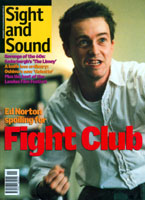Primary navigation

France 1999
Reviewed by Ginette Vincendeau
Our synopses give away the plot in full, including surprise twists.
France, the present. Marie, a schoolteacher, loves her partner Paul, but is frustrated by his refusal to make love to her. She picks up a young Italian named Paolo in a bar, and later they have sex. Robert, the head of her school, tells her there is a problem with her work. He takes her home to discuss it but they begin a series of ritualised S&M sexual encounters. She has rough sex which shades into rape with a stranger. Finally Paul makes love to her and she becomes pregnant. She undergoes a gynaecological examination and has vivid sexual fantasies. As she is about to give birth, Paul gets drunk. She opens the gas on the cooker and leaves for the hospital with Robert. She gives birth, with Robert present. Her flat is destroyed in an explosion which presumably kills Paul. Marie fantasises about Paul's funeral, while she holds her baby, also called Paul.
Much has been made in the press of the fact that Romance is one of the most explicit heterosexual art films to date, prompting both accusations of indecency and laudatory comparisons with Oshima's Ai No Corrida (1976). Central to Romance's scabrous image is the presence of Italian porn star Rocco Siffredi as the Italian stud Paolo who "fucks" Marie in a graphic take. Both male (erect and soft) and female genitals are on display here, along with head-on shots of Marie's gynaecological examination and her baby's birth. As Marie's voiceover explains: "I just want to be a hole; the more gaping, the more obscene, the truer it is; it's metaphysical, it's my purity."
Yet as Marie's mixture of obscenities and existential considerations indicates, Romance addresses its audience not as a sex film but as an intellectual artefact about sex. Culturally it belongs to a French tradition that goes back to de Sade and encompasses the writings of Apollinaire, Bataille, Klossowski and Pauline Réage (author of Histoire d'O), in which eroticism is a cerebral matter. As a film-maker Breillat radically undermines her movie's potential for titillation and voyeurism in a number of ways, often by using prosaic details. A discussion of used condoms and tampons comically precedes sex with Paolo, for example.
Breillat's aestheticisation of sex is indebted to the stillness of Japanese cinema. Her mise en scène is bluntly realistic in some ways, but distanced from naturalism. Romance's social anchorage is minimal: Paul is a model, Marie a teacher, but their social identity is as pared down as their white flat. Breillat's signature use of near-to-real time allows such scenes as Robert and Marie's bondage games to be presented in such hyper-realist detail they become almost abstract. Similarly the gynaecological examination is shocking not in a traditional moral sense, but because of the deadpan approach. "Romance would not be classified porn," Breillat has said, "not through self-censorship, but by finding another way of showing."
Inevitably, since Breillat is a woman, Romance prompts the question of whether this "other way of showing" is connected to gender and whether Romance can be regarded as a feminine or feminist exploration of female desire. Like many French female film-makers, Breillat denies the concept of 'women's cinema', seeking to be identified with a general view of authorship. And yet from her earliest films (such as 36 Fillette) she has focused single-mindedly on female sexuality. Both her recent Parfait amour! and Romance contain savage explorations of female desire and identity and critiques of French machismo and misogyny. Marie says at one point of Paul, "He dances because he wants to seduce, he wants to seduce because he wants to conquer, he wants to conquer because he is a man."
In other ways too Breillat foregrounds a female point of view and works in the tradition of the woman's film. For instance, Marie's voiceover dominates the soundtrack. The men are weak or merely instrumental - each of them fulfils a simple function (partner, father, mentor, and so on), after which he is discarded. By contrast, Breillat's women are complex. Contrary to stereotypical representations, they are not victims, mad or mysterious objects of desire. In Romance it is Paul who is a mystery.
Thus in many ways Breillat satisfies one of the key feminist demands in relation to women's cinema: that it should challenge patriarchal representations and give expression to the complexity of female desire. Her direct tackling of sexuality, unburdened by conventional morality and political correctness, is original and emotionally powerful. Romance is both fascinating and disturbing. Why, then, is it disappointing? One reason is that some of its erotic tropes are rather too close to old-fashioned, oppressive male fantasies: Robert's self-important Don Juan figure; the notion that genital penetration is less intimate than kissing; and, most problematic of all, Marie's longing to "meet Jack the Ripper." Is the price Breillat pays for auteur recognition that of endorsing male-pleasing fantasies of what 'masochistic' women supposedly want? As in the recent films of other French women directors (such as Tonie Marshall and Jeanne Labrune), Marie's sexual autonomy is gained at the expense of any other sense of worth. All this only seems to produce a profoundly pessimistic, even nihilistic, world view. There is a lot of sex in Romance, but not a lot of pleasure.